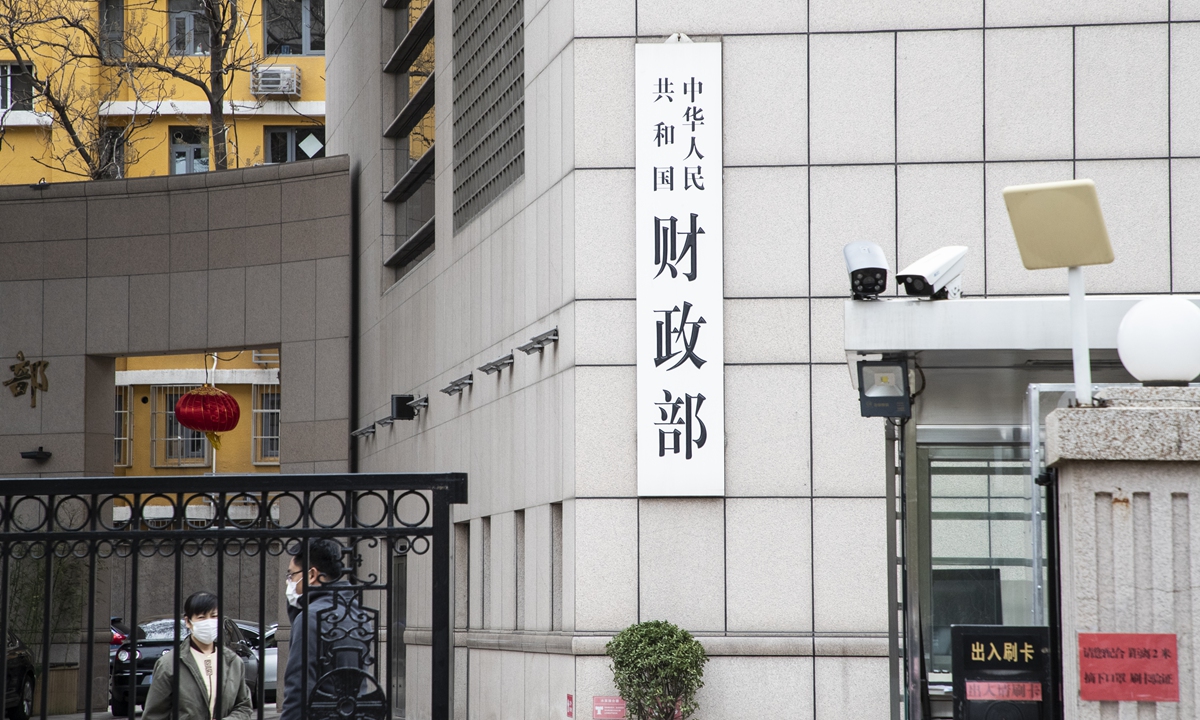
Ministry of Finance in Beijing Photo: VCG
China's fiscal policy in 2023 will focus on expanding consumption, promoting technological advancement and enhancing food security, efforts to boost the country's economic recovery, read the report on the central and local government draft budgets for 2023 submitted to the ongoing session of National People's Congress (NPC).Chinese experts noted that as the recovery of the world's second largest economy entered the fast track, targeted fiscal support will be important to create synergy with the monetary policy, to help fulfill the set targets for economic and social development this year.
According to the draft budget, in 2023, national revenue is projected to reach 21.73 trillion yuan ($3.92 trillion), an increase of 6.7 percent from 2022, while expenditure is expected to reach 27.514 trillion yuan, an increase of 5.6 percent year-on-year.
China's Ministry of Finance will increase spending for key projects including technological advancement, infrastructure buildup, rural revitalization and environmental protection. In addition, the ministry will continue to strengthen support to address areas of weakness in ensuring basic public well-being, including elderly care, education and health care.
Among the policies, the role of public finance in stabilizing investment and promoting consumption is listed a priority. The country will increase personal income through multiple channels to unleash consumption potential, and support major cities in strengthening logistics system to guarantee the supply of daily necessities, according to the draft budget.
Steven Alan Barnett, senior resident representative of the IMF in China, told the Global Times in an earlier interview that a key reason for the rebound in growth this year will be an increase in consumer spending. He projected that household consumption will contribute about 50 percent of China's GDP growth in 2023.
Spending increases in technological development represent another spotlight in the budget plan. China will improve the mechanism for managing government funds in line with a new system for mobilizing resources nationwide, in an all-out effort to achieve breakthroughs in core technologies.
The ministry will allocate 6.5 billion yuan for scientific and technological advancement at the local level under the guidance of central authorities - an increase of 2 billion yuan - supporting the development of regional hubs for innovation.
The main growth driver of fiscal spending on scientific research falls on local finance. Driven by factors including tax breaks for research and development (R&D) investment, the ratio of China's R&D spending to GDP stood at 2.55 percent last year, which played a vital role in promoting the country's industrial upgrading and building a modern industrial system, Tian Yun, an independent macroeconomist, told the Global Times on Monday.
According to the draft budget, the ministry will allocate 13.3 billion yuan of special funds for boosting high-quality development of the manufacturing sector, in an effort to support the development of integrated circuits and other key sectors.
"In recent years, we had a lot of breakthroughs in fields such as large aircraft, new-energy vehicles and new materials, and gained more independent space in high-level technologies, which is inseparable from China's persistent investment and incentives in scientific research," Tian said.
According to the draft, authorities will better guarantee inputs of rural revitalization and reinforce the foundations for food security on all fronts. The ministry will improve policy on subsidizing corn and soybean producers as well as increase the minimum purchase price for wheat and offer more rewards to major grain-producing counties.
It will allocate 45.9 billion yuan in subsidies for agricultural insurance premiums to ensure that more grain growers are covered.
"As the world's largest consumer and importer of food, China needs to plan ahead in terms of food security and material reserves," the expert said.
Global Times



